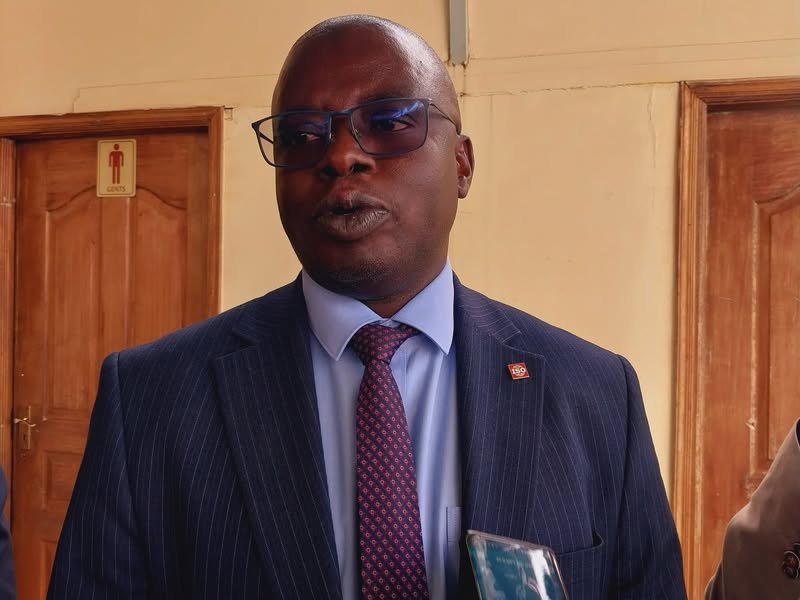 KEBS Director, Standards and Development Trade, Zacharia Lukorito addressing the press during a market surveillance stakeholder workshop at a Machakos hotel on May 29, 2025./GEORGE OWITI
KEBS Director, Standards and Development Trade, Zacharia Lukorito addressing the press during a market surveillance stakeholder workshop at a Machakos hotel on May 29, 2025./GEORGE OWITIThe agency’s officials are apparently traversing counties holding market surveillance stakeholder workshops.
KEBS Managing Director Esther Ngari said the role played by all stakeholders—manufacturers, importers, consumer organizations, retail outlets, and other government agencies—in ensuring that quality and safe products are offered to Kenyans can’t be underrated.
“It gives me great pleasure to welcome all of you to this forum whose theme is Trading in Quality Products; Safeguarding Consumer Confidence and Business Success, organized by Kenya Bureau of Standards (KEBS) and the County Government of Machakos,” Ngari said.
KEBS Director of Standards and Development Trade Zacharia Lukorito read Ngari’s speech during a workshop on consumer protection in Machakos county on Thursday.
The consumers and traders were sensitised on how to authenticate and verify that products in the market are genuine and meet the required standards.
“At KEBS, we have the SMS platform that you can use to verify whether a product in the market is genuine and meets required standards. To do that, compose an SMS by writing SM#, then indicate the standardization number indicated on the product, and send the SMS to 20023. You will receive a message confirming whether the product is genuine,” Lukorito said.
To verify genuine KEBS officers, Kenyans were advised to ask those purporting to be the agency’s employees for their staff identification card/number alongside ID numbers for verification. One needs to write HR (followed by the staff number provided by the person purporting to be a KEBS staff member) and send the SMS to 20023.
A response will be received indicating the officer’s name, ID number and whether he/she is still valid or active in the KEBS system.
The public should match the HR number with the purported KEBS staff’s ID number to verify that he/she is a genuine KEBS officer.
Ngari thanked the stakeholders for their key role towards assisting the government’s efforts towards sustainable development as outlined in the Bottom-Up Economic Transformation Agenda (BETA) and the Kenya Vision 2030 Fourth Medium Term Plan.
She said KEBS, in collaboration with other partner organizations, is committed to ensuring that it fulfills its mandate.
“The key roles played by KEBS Market Surveillance include protection of the health and safety of consumers, their economic interests, and the environment. It also includes the right to information to make decisions regarding goods and services, facilitating trade both within and outside the country and ensuring a level playing field for all players,” Ngari said.
The managing director said the creation of an independent Market Surveillance Directorate is a demonstration of the commitment of the KEBS Management and Board (NSC) to lay greater emphasis on consumer protection and trade facilitation.
She said KEBS recognises that it cannot achieve its mandate on its own without partnership with other stakeholders.
“Mutual collaboration can be achieved in product testing, intelligence on the presence of substandard products, self-regulation, and standards development,” Ngari said.
Ngari said KEBS had partnered with other agencies such as the National Police Service, Anti-Corruption Agency, National Construction Agency, Communication Authority of Kenya, Kenya Revenue Authority, county governments, and Weights and Measures for concerted efforts in the fight against illicit goods.
She noted that despite many challenges, KEBS Market Surveillance had made notable achievements in enforcement of standards.
Ngare said KEBS continues to receive consumer complaints on substandard products in the market despite the efforts and progress made.
“As a regulator, KEBS is concerned that consumers, in addition to being exposed to substandard products, are not getting value for their money. This goes contrary to consumer rights as enshrined in Article 46 of the Constitution of Kenya 2010 and The Standards Act,” Ngari said.
Several topics regarding the quality of products in the Kenyan market were covered during the workshop.
They also included the role of each stakeholder in ensuring the same alongside the government's efforts to equip traders with tools and knowledge necessary to identify, source, and sell quality products that comply with product standards.
KEBS has developed a Market Surveillance Strategy, which provides a framework for improved delivery of the role of the Market Surveillance Directorate in promoting consumer protection while at the same time facilitating fair trade in the marketplace.
The strategy is pillared on preventive controls, reactive controls, risk based market surveillance, application of market intelligence in market surveillance and communication, all which are aimed at ensuring consumer protection and at the same time facilitating fair trade in the era of a liberalised global economy.









